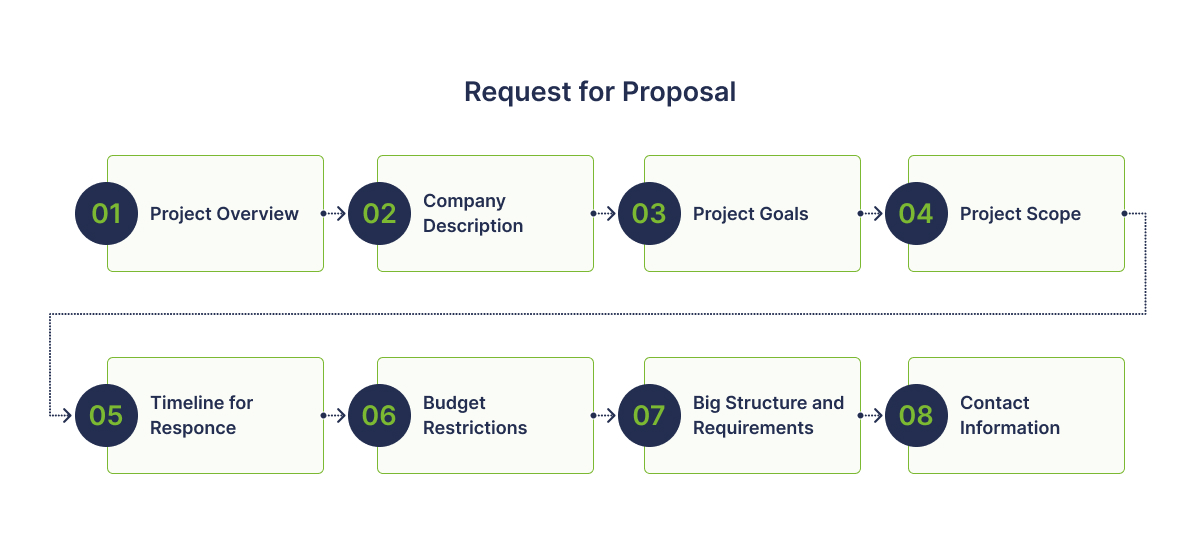How to Write a Request Proposal (RFP) for Software Development
In order to ensure that your company is constantly in demand and able to compete with others on the market, you need to regularly review your business processes, improve them, and focus on implementing new services. Frequently, custom software development is required for this, as it is the only way you will be able to fulfill all your needs.
IT outsourcing is an ideal option through which you can delegate the entire development process to professionals. However, to find a good partner and definitely get the desired results, it is best to proceed with writing a Request Proposal (RFP).
What is an RFP for software development?

Formally, the RFP can be called a document that is drafted by a company in order to find a reliable and suitable partner to work on a project. This paper lists the main ideas, objectives, characteristics and requirements for the outsourcing partner.
In general, it contains everything for potential vendors to understand what they will have to work on. At the same time, it may help the company to choose the best candidate and be confident in the quality result.
Never think that writing a request proposal can be taken lightly. This is an extremely serious stage that will affect the quality of cooperation and the development process as a whole. So, it is worth to work hard on it.
RFPs are commonly used in various industries, including technology, construction, consulting, and many others, where organizations want to make informed decisions about selecting vendors for a particular project or service.
How to write a request proposal?
Obviously, there is no single RFP template that would be applicable to absolutely any type of project. But, below you will find some basic points that definitely should be included in the document. Here they are:
Describe the main idea of the project
This small, clearly worded paragraph should explain why you are looking for a development partner and what they will need to work on. In other words, you should state your project idea so that the vendor understands in general terms your goals and whether they will be able to help you achieve them.
Share your company's concept and philosophy
Of course, to better understand each other, you should tell your partner about your company and familiarize them with what you do.
In this point, you are expected to mention the name of the organization, the industry you work in, what services or products you offer to customers, what the company's position in the market is and what philosophy you follow.
Read also: 5 Tips on How to Improve Remote Team Communication Culture
Define the goals and share your vision for the project
The vendor needs to have a clear idea of what you want to accomplish at the end of the development process. Highlight a few main goals that the software should help you achieve. Then you are free to mention a few secondary goals that you'd ideally like the software to tackle as well.
Also, it is good if you and your team have a rough idea of the UX/UI design you would like to see in the finished solution. Specify what look and feel it should have, what processes it should facilitate and how easy or difficult it should be for use.
Read also: Outsourcing Development for Startups: Main Reasons and Pitfalls to Avoid
Outline the project scope
This piece is an extension of the previous one, but reveals much more details. For this reason, it will be the most extensive in the entire RFP. Be sure to list all the technical details that will help the partner figure out the course of the project and what exactly is required to be done. For example, you may include subparagraphs such as:
- Product requirements
Explain the tasks that the software should perform for you. Don't forget to mention how users are expected to interact with the finished solution. Get more info about software requirements specifications (SRS) and its main components. - Give a brief overview of your infrastructure
In order to implement a new solution in your business, the vendor must understand what kind of infrastructure you have, and whether you are ready to buy or change something. - Technologies
If you are considering the use of certain technologies in the finished product, specify which ones. - Work model
Indicate the method of cooperation that is most comfortable for you. For example, it could be Agile, which is currently in demand on the market and is suitable for almost everyone. - Metrics for measuring success
Talk about how you will evaluate the final product and what methods will be used to do so. This way, the team will have a sense of what to emphasize in the work. - Team composition
List the specialists you need to work on the solution. Also, if you have in-house experts that you want to include in the team, you should mention this in advance.
Read also: Best Practices for Outsourcing Software Development
Indicate the budget you have at your disposal
When you roughly understand the scope of work on your software, you will be able to estimate how many working hours the development team can spend on it. Next, analyzing the current prices on the market approximately calculates the cost. After that, set a realistic budget for the project and let partners know about it.
Get an estimation of your software product development from SDH team now! Drop us a line: [email protected].
Define cooperation models
Ask the potential partner to provide you with information that will help you to decide about cooperation and payment options.
It's crucial to note that the choice between these models depends on the specific needs, goals, and preferences of the client and the nature of the software development project. the most popular cooperation models in software development outsourcing are:
- Dedicated team
- Staff augmentation
- Strategic partnership
|
Feature |
Dedicated Team |
Staff Augmentation |
Strategic Partnership |
|
Team Ownership |
Entire team is solely dedicated to the client's project. |
Individual resources assigned to client's project. |
Shared responsibility between client and vendor. |
|
Team Structure |
Fixed team structure with predefined roles and responsibilities. |
Flexible, resources can be added or removed as needed. |
Customized team structure based on project requirements. |
|
Control & Oversight |
High level of control and oversight by the client. |
Moderate control with flexibility in resource management. |
Shared control, collaborative decision-making. |
|
Project Involvement |
Deep involvement in the entire project lifecycle. |
Resources are involved in specific project phases. |
Involvement throughout the project, with focus on strategic aspects. |
|
Flexibility |
Limited flexibility in team composition. |
High flexibility to adjust team size and skills. |
Flexible, allowing adaptation to changing project needs. |
|
Risk Management |
Lower risk due to dedicated team commitment. |
Moderate risk as resources may be shared across projects. |
Shared risk, with a focus on long-term collaboration. |
|
Communication |
Direct and frequent communication with the dedicated team. |
Direct communication with augmented staff. |
Open and transparent communication, collaborative planning. |
|
Skill Scalability |
Limited scalability as the team is fixed. |
High scalability with the ability to quickly scale up or down. |
Scalable, with a focus on evolving skill requirements. |
|
Cost Structure |
Fixed monthly cost for the entire dedicated team. |
Hourly or monthly rates for augmented staff. |
Customized pricing based on the level of partnership. |
|
Long-term Relationship |
Suited for long-term projects and relationships. |
Suited for both short-term and long-term projects. |
Focused on long-term collaboration and mutual growth. |
|
Strategic Alignment |
Limited strategic alignment beyond the project scope. |
Limited strategic alignment, primarily focused on resource needs. |
Strong strategic alignment with a focus on achieving business goals. |
You may need some additional information to help you weed out unsuitable candidates for a partnership. It's best to ask for it right away and then use it to select suitable companies.
SDH offers top-tier dedicated teams and talents for staff augmentation to build top-notch IT products. Ask for a free consultation now: [email protected].
Provide a time frame for response
After you distribute your RFP (no matter what method you choose for that), set a time frame within which you want to hear back from applicants. This way you won't have to wait long and you won't disrupt your project timeline.
Include your contact information
At the end of the document, give options on how potential partners can contact you. It is important to keep your email or phone active at all times so you don't miss out on a reliable outsourcing company.
Useful tips to consider when writing a Request Proposal
Be as specific as possible
In a document like an RFP, you need to focus on being specific and concise so that the reader doesn't lose the main point. Also, while writing, try to keep your sentence structure simple and avoid using jargonisms so that the text is accurately understandable.
Highlight the qualities you will be looking for in a partner
Make a list of several criteria by which you will evaluate all candidates. Try to compare them and at the end select a few best ones for your enterprise. After communicating with them, you will already choose a favorite with whom you will cooperate. Do not set too many requirements and try to be realistic, only in this way you will find the suitable variant.
Do not try to save money
No matter how cliché it may sound, you have to pay for quality. Therefore, remember to set a reasonable budget for the project and don't go at the bottom of the market. Choose the best professionals who have enough experience in your field.
Contact SDH experts for help
SDH has been in the IT outsourcing market for over 17 years. During this time we have accumulated in our team the best experts in their field, who can handle a project of any level of complexity. The spheres for which we developed software are diverse. That's why our knowledge and experience is so extensive.
If you need a really reliable partner who will take care of your project from A to Z, then write to us to learn more about terms of cooperation and get advice on your idea.
Categories
Share
Need a project estimate?
Drop us a line, and we provide you with a qualified consultation.









